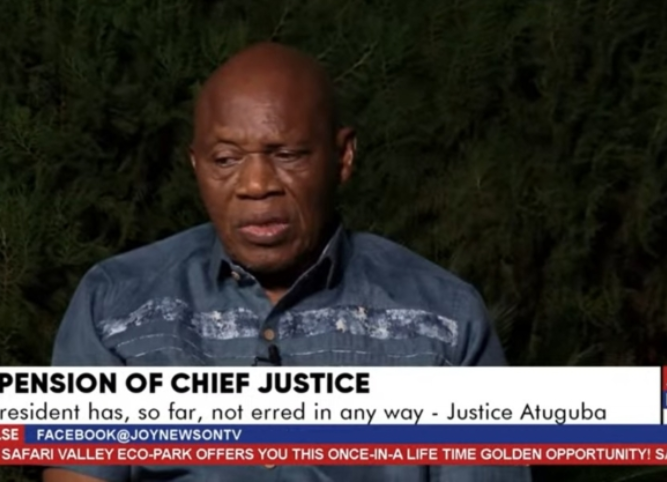Retired Supreme Court judge, Justice William Atuguba, has criticised the opposition New Patriotic Party (NPP) over its handling of the suspension of the Chief Justice, Her Ladyship Justice Gertrude Torkornoo.
Speaking on JoyNews’ The Pulse, Justice Atuguba dismissed the NPP’s response as “rubbish,” stating that their posture merely serves to advance their narrative.
The Supreme Court, in a narrow 3–2 ruling delivered on Tuesday, May 7, dismissed a case brought by the Member of Parliament for Old Tafo, Ekow Vincent Assafuah. The case challenged the President’s decision to suspend and initiate removal proceedings against the Chief Justice following petitions alleging misconduct.
According to Justice Atuguba, “Scanning through the events in the court, that is rubbish.”
He argued that the NPP had no objections when Justice Gertrude Torkornoo was making decisions in their favour, hence their public outcry over her suspension.
The suspension of Chief Justice Torkornoo has sparked controversy across the political divide. While the Presidency maintains that the move is in line with constitutional requirements, the NPP has strongly condemned the action, describing it as a politically motivated attempt to erode the independence of the judiciary.
The NPP also staged a protest in Accra, drawing hundreds of supporters, party executives, sympathisers, and members of other opposition political parties.
Protesters marched through major streets, wielding placards with inscriptions such as “Hands Off Our Judiciary,” “Stop the Interference,” and “Justice Must Be Independent.”
The demonstration, which culminated in the submission of a petition to the Supreme Court, the Speaker of Parliament, and the President, was described by organisers as a move to push the President to reconsider his decision.
The Chief Justice’s abrupt suspension followed allegations of misconduct linked to administrative decisions she reportedly made regarding judicial appointments and procurement processes.
Critics of the suspension argue that it sets a dangerous precedent and opens the judiciary to political manipulation.
ALSO READ:



